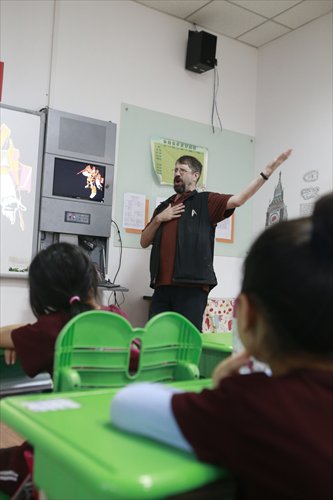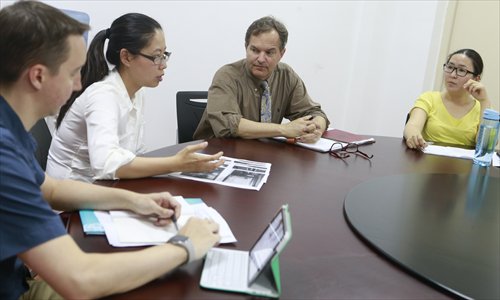International schools finding it harder to get good, qualified teaching professionals

A fifth grade English teacher during class at Beijing Royal School Photo: Li Hao/GT
Zhao Chenlong, a recruiter for the Beijing Royal School (BRS), an international school in Changping district, recently returned from the spring job fairs in the US. Spring is the busiest season for international schools seeking foreign teachers and vice versa.
Previously, Zhao used agents to find foreign teachers. But this recruitment season, he decided to go directly to the source after it became apparent that the demand for good, qualified teachers far exceeded the supply.
"As our school is developing rapidly, we are in great need of foreign teachers, and it is becoming harder to find skilled professionals," said Zhao.
"Every week, I receive hundreds of e-mails from candidates or agents, but after doing a CV, reference letter, and background check, only a few are left."
According to statistics from the International School Consultancy (ISC) Research, a UK-based company that provides data on the international school market, there has been an enormous growth in the number of international schools in China. In 2011, 274 international schools were teaching 108,700 students with 11,200 teachers. The number of international schools grew to 545 with 212,900 students and 20,600 teachers in 2016.
As the number of international schools in China rises, so does their need for foreign teachers. But, the continued shortage of foreign teachers poses a significant challenge.

Francis Felicelli (third from left), director of the foreign teacher's department at Beijing Royal School, chairs an International Baccalaureate (IB) meeting with other teachers. Photo: Li Hao/GT
Not enough incentives
For Francis Felicelli, a certified teacher with over 20 years' experience teaching in public schools in the US, moving to China to teach was largely by chance.
After decades of teaching in the same place, Felicelli decided that relocating to a foreign country would give him an excellent chance to explore before retiring. Some time after, he came upon a BRS advertisement and applied.
When he first told his colleagues about wanting to move to China to teach, they thought he was crazy.
"They know quite little about China and international schools in China. [They thought] I was talking nonsense," said Felicelli, 56, who arrived in Beijing last year and works as the director of the foreign teacher's department at BRS.
"We have over 2,000 students with over 50 foreign teachers, mainly from the US and Canada. As the school expands, we want to double the presence of foreign teachers," said Felicelli.
For him, the market is a seller's market because new schools are springing up everywhere, but it is not a good enough incentive for many foreign teachers.
He said that when he asked his former colleagues back in the US to come for jobs in China, they refused, citing reasons like air pollution, and relatively low pay compared to what they are getting in their home country.
Andrew Wigford, the managing director of Teachers International Consultancy (TIC) Recruitment, an international school recruitment organization based in the UK, agreed. He said the disparity between the teachers' expectations and reality creates a high turnover in the job market.
"Lots of teachers arrive in China and then find that they are living in substandard accommodations, realize the pollution is worse than they expected, or are not supported in the way they are used to and, as a result, leave very quickly, oftentimes within the year," said Wigford.
He said his company gets a lot of candidates who say they will work anywhere in the world, except China. "Many of the candidates are unsure about [taking a job in China] unless they feel confident in the school they will be working at and know that their package is a good one," said Wigford.

A teacher tutors a student at the House of Knowledge (HoK) International Kindergarten and Elementary School. Photo: Courtesy of HoK
Rapidly-changing policies
The rapidly changing policies regarding the requirements for foreign teacher employment also pose another challenge for recruiters and foreign teachers alike.
According to an earlier guideline posted on the State Administration of Foreign Experts Affairs (SAFEA) website in 2004, foreign teachers should have a bachelor's degree or higher with a minimum of five years' teaching experience. Language teachers should have a bachelor's degree or higher with a minimum of two years' teaching experience.
Farshad Danicek, a co-founder and education director of House of Knowledge (HoK) International Kindergarten and Elementary School in Beijing, thinks the strict requirements might limit the supply of foreign teachers.
According to Danicek, ideal candidates are usually over 30 by the time they can satisfy all the requirements, and at that age, many are just starting to have a family, which makes moving to China less of an option.
"It is very difficult to attract teachers to China who already have close relations back home, especially faced with the bad air, high rent, and high tuition for their children if the school they work at does not provide free schooling," said Danicek.
For schools that can afford a good payment package for experienced foreign teachers, attracting new staff is not a problem. But for many other schools, it is a struggle, he said.
According to an April report on edu.sina.com.cn, an educational news portal, 50 percent of an international school's expenditure goes to foreign teachers' salary. The yearly pay for foreign teachers in several high-end international schools in Beijing ranges from 300,000 yuan ($45,150) to 500,000 yuan.
"Paying high salary and package for foreign teachers is one of the reasons the tuition is so expensive. But, to keep qualified and experienced foreign teachers, schools have to increase the salary and package, which will continue to cause an increase in tuition fees," said Danicek.
Zhao said the government has loosened the regulations since September, which is a very good change that could broaden the pool.
In September 2015, the SAFEA issued a new guideline on its website. The teaching experience requirement for foreign teachers was reduced from five years to two.
The requirement could be waived if foreigners have a bachelor's degree or higher in education. For teachers who have a bachelor's degree or higher in other subjects, if they have a teaching certificate from their home country, or an international language teaching certificate issued by SAFEA, or a teaching English as a foreign language (TEFL) certificate, they are also exempt for the teaching experience.
"The new policy loosens the requirements, which gives us more choices. Yes, it is more stringent on background checks and has more paperwork, but it lets the good in and shuts out all the bad," said Zhao.
His school recruited several qualified graduates from university fairs after the new policy came into effect.
Wigford said some schools may not be fully aware of the changes yet.
"The regulations are changing significantly and rapidly right now and that can be very challenging for schools trying to find expat teachers," said Wigford, adding that the government should try some more efficient ways to inform schools and recruiting firms about their latest changes.
Meeting the challenge
The demand for foreign teachers has led some "international" schools to hire unqualified ones, which can hurt qualified teachers.
Peter Jones is a certified teacher with over eight years' experience teaching in China and the UK. He is also the director of international education of Golden Kids International Kindergarten. Jones thinks the so-called international schools just want foreign faces in the classroom and don't care about quality.
"Trained, experienced foreign teachers are expensive to hire. Why would they pay 25,000 yuan a month for a qualified teacher when they can hire an unqualified and inexperienced 'foreign face' for 12,000 yuan a month?" said Jones.
For these so-called schools, it is very hard to retain teachers due to impossible working conditions, bad management, few holidays, and not being respected, he said.
For people like Jones, it might be a good news that in May, the Foreign Teachers Commission, which claims to be the first civil organization of its kind for foreign teachers in China, was founded in Beijing.
The organization aims to build industry standards and improve the relations between supply and demand in the market by advocating more reasonable pay, working conditions and agency fees, according to Ding Zhifeng, the commission's general secretary.
It already counts more than 40 universities, international schools, training institutions and recruitment consultancies as its members and is still expanding, Ding said. Danicek said he understands that the government's goal is to kick bad or fake foreign teachers out of China. However, he hopes that the government would liaise with international schools to get their thoughts.
"I hope that both sides could have a discussion on some ideas and clear standards for recruiting foreign teachers instead of putting a cutoff line," he said.
After going directly to the source, Zhao suggested that schools could try to get teachers via the same method.
"It is very good way of finding candidates," he said. "Although it costs a lot, the outcome is very good."
So far, BRS has recruited five teachers using this method.
Zhao added that BRS also cooperates with some foreign universities by providing internships for their graduates. He said after several months' internship, some graduates will choose to stay.
In Felicelli's case, although his daughter will be leaving BRS to attend another international school in Beijing, he said he will not change his job because the school treats him well.
He plans to stay at BRS for at least another two years.
"I think there are two types of foreign teachers in China: those who want to be here to teach and those who have to be here to teach. Luckily, I belong to the first group," he said.
Newspaper headline: Foreign teacher shortage